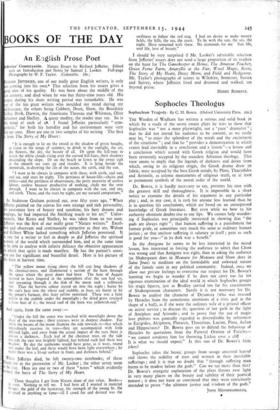OOKS OF THE DAY
An English Prose Poet
riferies' Countryside. Nature Essays by Richard Jefferies. Edited with an Introduction and Notes by Samuel J. Looker. Full-page Photographs by W. F. Taylor. (Constable. 10S.) CHARD JEFFERIES, one of our really great English writers, is only st coming into his own.* This selection from his essays gives a ood idea of his quality. Hz was born about the middle of the st century, and died when he was but thirty-nine years old. His input during his short writing period was remarkable. He was le of the ten great writers who moulded my mind during my dolescence, the others being Cobbett, Ibsen, Shaw, the Beardsley Mow Book, Darwin, the Americans Thoreau and Whitman, Olive chreiner and Shelley. 4 queer medley, the reader may say. So is e mind of each of uS. I found Jefferies particularly " sym- athetic," for both his heredity and his environment were very le my own. Here are one or two samples of his writing The first from The Story of My Heart : "It is enough to lie on the sward in the shadow of green boughs, to listen to the songs of summer, to drink in the sunlight, the air, the flowers, the sky, the beauty of all. Or upon the hill-tops to watch the white clouds rising over the curved hill-lines, their shadows descending the slope. Or on the beach to listen to the sweet sigh as the smooth sea runs up and recedes. It is lying beside the immortals, in-drawing the life of the ocean, the earth, and the sun.
" I want to be always in company with these, with earth, and sun, and sea, and stars by night. The pettiness of house-life—chairs and tables—and the pettiness of observances, the petty necessity of useless labour, useless because productive of nothing; chafe me the year through. I want to be always in company with the sun, and sea, and earth. These, and the stars by night, are my natural companions."
As Anderson Graham pointed out, over fifty years ago, " When efferies painted on the canvas his own strange and rich personality, passionate love of beauty and sunshine, his fiery dreams and ngings, he had imparted the finishing touch to his art." Unfor- driately, like Keats and Shelley, he was taken from us' too .soon. Aeries was the first of our really great " Nature writers." Excel- at and observant and continuously attractive as they are, Walton -Id Gilbert White lacked something which Jefferies possessed. It rare for a writer to feel as deeply as did Jefferies the spiritual ,intent of the world which surrounded him, and at the same time he able to analyse with infinite delicacy the objective appearances which that spirit is made manifest. He has the painter's sensi- ‘e eye for significant and beautiful detail. Here is his picture of he barn at harvest time.
" The yellow moon rising above the hill cast long shadows of the chestnut-trees, and illuminated a section of the barn through the space where the great doors had been The haze of August seemed to have lingered in the atmosphere after the sun had set, and streaming through it the disk of the moon took a yellbwish tint. Thus the harvest colour stayed on into the night ; burnt by the sun's heat into the wheat and stubble, as hues are burnt in by the potter's furnace, this hazy yellow remained. There was a faint yellow in the stubble under the moonlight ; the dried grass retained a faint hint of it ; the broad roof of the barn was yellowish-red."
And again, from the same essay:-
" Under the hill the copse was touched with moonlight down the slope of the tree-tops ; their recesses were in deepest shadow. For while the beams of the moon illumine the side towards it—that which immediately receives its rays—they are accompanied with little diffused light, and away from the actual impact of the rays there is always a darkness. Each leaf of the chestnut trees on the side to ards the east was brightly lighted, but behind each leaf there was shadow. By day the sunbeams would have gone, as it were, round and under the leaf, and there would have been light everywhere ; by night there was a lit-up surface in front, and darkness behind."
When Jefferies died, he left twenty-two• notebooks; of these fieen are in the possession of Mr. Looker ; the other seven seem ' be lost. Here are one or two of these " notes " which evidently 'rrned the basis of The Story of My Heart.
" Those thoughts I got from Nature alone of any value. Books— In vain. Nothing to tell me. I had here all I wanted in material th'ngs: the gold of the buttercup, the strength of the young fir, the er excel in anything or fame—all I cared for and desired was the
swiftness to follow the red stag. I had no desire to make money fields, the hills, the sea, the coast. To be with the sun, the sea, the night. Have remained with these. No diamonds for me. Sun life, soul life, love of beauty."
I should be very surprised if Mr. Looker's admirable selection from Jefferies' essays does not send a large proportion of its readers on the hunt for The Gamekeeper at Home, The Amateur Poacher, Green Ferne Farm, Amaryllis at the Fair, Wood Magic, Bevis, The Story of My Heart, Dewy Morn, and Field and Hedgerow. Mr. Taylor's photographs of scenes in Wiltshire, Somerset, Sussex and Surrey, where Jefferies lived and dreamed and walked, are beyond praise.
HARRY ROBERTS.






















 Previous page
Previous page